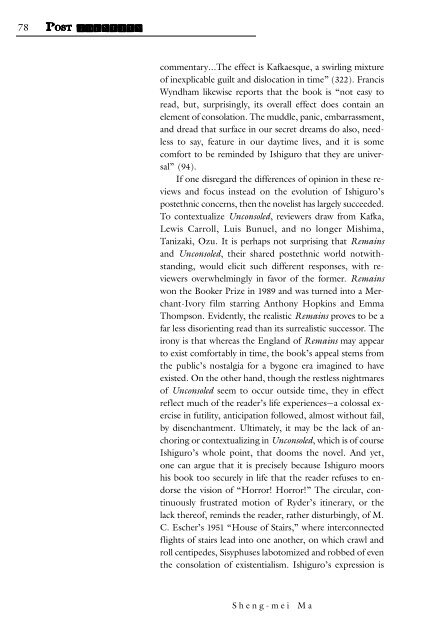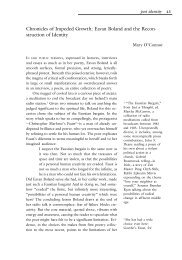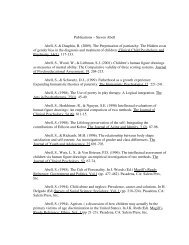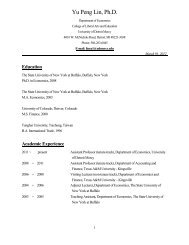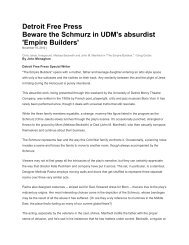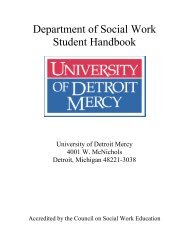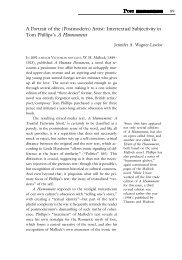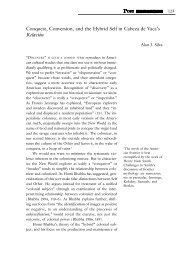Kazuo Ishiguro's Persistent Dream for Postethnicity: Performance in ...
Kazuo Ishiguro's Persistent Dream for Postethnicity: Performance in ...
Kazuo Ishiguro's Persistent Dream for Postethnicity: Performance in ...
You also want an ePaper? Increase the reach of your titles
YUMPU automatically turns print PDFs into web optimized ePapers that Google loves.
78 POST OST IDENTITY<br />
IDENTITY<br />
commentary…The effect is Kafkaesque, a swirl<strong>in</strong>g mixture<br />
of <strong>in</strong>explicable guilt and dislocation <strong>in</strong> time” (322). Francis<br />
Wyndham likewise reports that the book is “not easy to<br />
read, but, surpris<strong>in</strong>gly, its overall effect does conta<strong>in</strong> an<br />
element of consolation. The muddle, panic, embarrassment,<br />
and dread that surface <strong>in</strong> our secret dreams do also, needless<br />
to say, feature <strong>in</strong> our daytime lives, and it is some<br />
com<strong>for</strong>t to be rem<strong>in</strong>ded by Ishiguro that they are universal”<br />
(94).<br />
If one disregard the differences of op<strong>in</strong>ion <strong>in</strong> these reviews<br />
and focus <strong>in</strong>stead on the evolution of Ishiguro’s<br />
postethnic concerns, then the novelist has largely succeeded.<br />
To contextualize Unconsoled, reviewers draw from Kafka,<br />
Lewis Carroll, Luis Bunuel, and no longer Mishima,<br />
Tanizaki, Ozu. It is perhaps not surpris<strong>in</strong>g that Rema<strong>in</strong>s<br />
and Unconsoled, their shared postethnic world notwithstand<strong>in</strong>g,<br />
would elicit such different responses, with reviewers<br />
overwhelm<strong>in</strong>gly <strong>in</strong> favor of the <strong>for</strong>mer. Rema<strong>in</strong>s<br />
won the Booker Prize <strong>in</strong> 1989 and was turned <strong>in</strong>to a Merchant-Ivory<br />
film starr<strong>in</strong>g Anthony Hopk<strong>in</strong>s and Emma<br />
Thompson. Evidently, the realistic Rema<strong>in</strong>s proves to be a<br />
far less disorient<strong>in</strong>g read than its surrealistic successor. The<br />
irony is that whereas the England of Rema<strong>in</strong>s may appear<br />
to exist com<strong>for</strong>tably <strong>in</strong> time, the book’s appeal stems from<br />
the public’s nostalgia <strong>for</strong> a bygone era imag<strong>in</strong>ed to have<br />
existed. On the other hand, though the restless nightmares<br />
of Unconsoled seem to occur outside time, they <strong>in</strong> effect<br />
reflect much of the reader’s life experiences—a colossal exercise<br />
<strong>in</strong> futility, anticipation followed, almost without fail,<br />
by disenchantment. Ultimately, it may be the lack of anchor<strong>in</strong>g<br />
or contextualiz<strong>in</strong>g <strong>in</strong> Unconsoled, which is of course<br />
Ishiguro’s whole po<strong>in</strong>t, that dooms the novel. And yet,<br />
one can argue that it is precisely because Ishiguro moors<br />
his book too securely <strong>in</strong> life that the reader refuses to endorse<br />
the vision of “Horror! Horror!” The circular, cont<strong>in</strong>uously<br />
frustrated motion of Ryder’s it<strong>in</strong>erary, or the<br />
lack thereof, rem<strong>in</strong>ds the reader, rather disturb<strong>in</strong>gly, of M.<br />
C. Escher’s 1951 “House of Stairs,” where <strong>in</strong>terconnected<br />
flights of stairs lead <strong>in</strong>to one another, on which crawl and<br />
roll centipedes, Sisyphuses labotomized and robbed of even<br />
the consolation of existentialism. Ishiguro’s expression is<br />
Sheng-mei Ma


